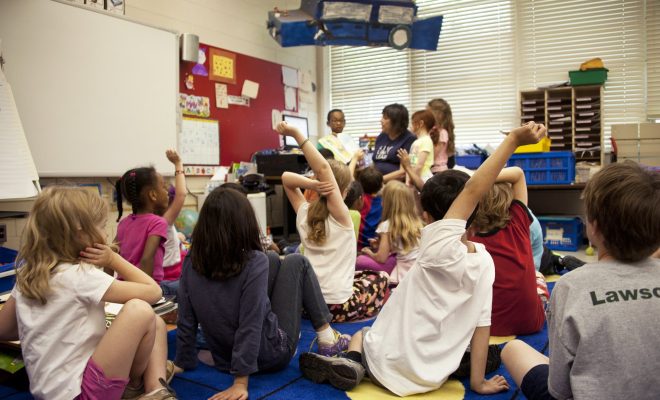Johnson C. Smith University opens STEM education & research center

**The Edvocate is pleased to publish guest posts as way to fuel important conversations surrounding P-20 education in America. The opinions contained within guest posts are those of the authors and do not necessarily reflect the official opinion of The Edvocate or Dr. Matthew Lynch.**
A guest post by Anwar Dunbar
“The collaboration was strong between the administration, the faculty, and the students to make sure that we had a building that not just reflected the heritage and history of the past, but also what the future would be for this great University,” said Harvey Gantt, one of many speakers on hand for the opening of Johnson C. Smith University’s (JCSU) new Science Center. “Dr. Carter actually had a lot to do with choosing the design approach,” Mr. Gantt continued. “We gave him several alternatives, and when we showed him a rendering of this elevation of the building, in less than 10 seconds, he said, ‘That’s what I want on this campus!’”
On Friday, Oct. 23, JCSU opened its new Science Center with a Grand Opening and Ribbon Cutting ceremony as a part of its 2015 Homecoming festivities. The ceremony took place on the walkways between the University’s new structure and its older Rufus Perry Science Hall. The ceremony consisted of:
- A welcome by Monroe Miller (Chairman of the JCSU Board of Trustees);
- An invocation by current student Sydney Henry (Class of 2017, Biology and Chemistry);
- Remarks by: Steve Keckeis (Vice President of Messer Construction), Malcolm Davis and Harvey Gantt (Principal and Principal Emeritus of Bergman Associates), student Jennifer-Lynn Phipps (Class of 2016, Computer Science Information Systems), and Charlie Lucas (Board Member of The Duke Endowment) and finally;
- Closing Remarks by Dr. Ronald L. Carter (President of JCSU).
“The time has now come to cut the ribbon to a new world experience. I can just hear the voices of the freedman who put the bricks in place by night over at Biddle Hall. As they look over here, I can hear them saying this day, ‘Well done! Well done! Well done! Our future holds high,” said Dr. Carter during his closing remarks prior to chanting three times, “J-C!,” to which the audience replied, “S-U!,” the signature call and response of the University’s students and alumni.
While the new Science Center will now be the hub on campus for all scientific coursework and research, the older Perry Science Hall will now be the home for the new Metropolitan College, JCSU’s new department for educating non-traditional students. Some features of the new Science Center include:
- 10 fully equipped labs for Biology, Chemistry and Physics courses and research;
- Four Centers for new science and technology curricula including: the Center for Renewable Energy and Sustainability, the Center for Bioinformatics/Biotechnology, the Center for Medical Informatics, and the Center for Analytical Research and;
- Seven classrooms of various sizes and setups which stay true to JCSU’s commitment to small class sizes and individualized faculty attention.
“This building has been a vision for almost five years. Magdy Attia, Perrin Foster, Monroe Miller, Tom Baldwin and I would sit and dream about it. We knew that it had to be somewhere here on this part of the campus. That vision just had a momentum and Magdy would sentence it in very eloquent ways such that donors started paying attention and saying, ‘This can be done,’” Dr. Carter said afterwards during the open house. Throughout the ceremony, he and the other speakers emotionally paid homage to Dr. Magdy Attia who recently passed away. Dr. Attia, once a Computer Science faculty member and then an Administrator, was a key figure in the conception of the new Science Center.
“Opportunity awaits those who want to work,” said Jennifer-Lynn Phipps in closing to the audience at the ceremony. Ms. Phipps will graduate in 2016, and then work for John-Deere as an Information Technology Integrator. “Remember Smithites we are not only here to smash the mold, but we’re also here to develop ourselves and change the world!”
One of the more intriguing aspects of the new Science Center is the Center for Renewable Energy and Sustainability. The Center is focusing its work on: Wind, Solar and Bio-fuels, and Food Security, specifically helping lower income communities have better access to quality food. Dr. Philip Otienoburu is in large part the University’s expert in Environmental Science issues, a distinction once held by the late Dr. Joseph Fail, Jr.
“It’s all about energy sustainability. We’re looking at future generations and how the environment is going to be protected from the different things that we do to it,” said Dr. Philip Otienoburu. “Long-term sustainability involves not only environmental issues but also social and economic issues as well. How are people going to build resilient communities as the climate changes for instance? How are people going to feed themselves? As you will see a lot of our programs here involve, ‘Food Security.’ This is why we have the Aquaponics and Community garden which is a partnership between JCSU and the surrounding neighborhoods.”
“Aquaponics is a polyculture system of agriculture where you grow crops and cultivate fish in one closed loop. The waste produced by the fish, which is for the most part Ammonia, is used to fertilize the crops,” said Dr. Phillip Otienoburu discussing a component of the University’s Energy Sustainability research work. “In Aquaponics, you use bacteria to make the biological conversions to convert Ammonia into Nitrites, and then the Nitrites into Nitrates which the plants need to grow. We’ve been doing this for about three years now during which we have expanded into Haiti, where we were looking to help communities that were devastated by the earthquake in 2010.”
“The science education here at JCSU has become much more technologically advanced since the late 1990s. As you can see in this building the instruments have become much smaller and in some ways more affordable and we’re able to generate more data. That said, it still involves engaging nature, collecting data and constructing good experiments,” said veteran Chemistry Professor, Dr. Timothy Champion.
“While we still have quite a few students coming in wanting to do Pre-Med, some do change their minds and think about getting Ph.D.s once they have a chance engage the science and do some research,” Dr. Champion continued. “At least in the Biology and Chemistry side though, we also need to prepare some of them for the job market. We can’t fall into the trap of trying to produce copies of ourselves – that is more Ph.D.s. If a student doesn’t go to a Graduate or Professional school there are still jobs out there, so a lot of what you’re here seeing is our wanting to build more sellable skills for the students that they can immediately apply to the job market.”
Read all of our posts about EdTech and Innovation by clicking here.
_____________
Anwar Y. Dunbar is a Regulatory Scientist in the Federal Government where he registers and regulates Pesticides. He earned his Ph.D. in Pharmacology from the University of Michigan and his Bachelor’s Degree in General Biology from Johnson C. Smith University. In addition to publishing numerous research articles in competitive scientific journals, he has also published over one hundred articles for the Examiner (www.examiner.com) on numerous education and literacy related topics in the areas of; Current Events and Culture, Higher Education, Financial Literacy, and STEM (Science, Technology, Engineering and Mathematics). He actively mentors youth and works to spread awareness of STEM careers to minority students. He also tutors in the subjects of Biology, Chemistry and Physics. He is a native of Buffalo, NY. He can be contacted via email at [email protected], and can be followed on Twitter @anwaryusef.






